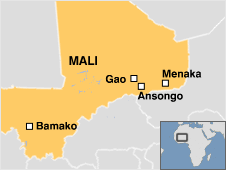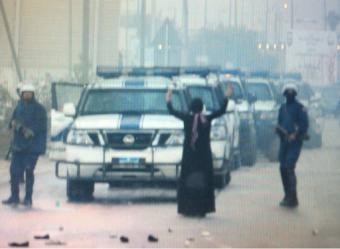Mali (and Beyond) Live: At Least 7 Killed in Timbuktu Fighting
 Monday, April 1, 2013 at 9:45 |
Monday, April 1, 2013 at 9:45 |  Scott Lucas in
Scott Lucas in  Africa,
Africa,  EA Global,
EA Global,  EA Live,
EA Live,  EA Middle East and Turkey,
EA Middle East and Turkey,  Middle East and Iran
Middle East and Iran See also Syria Live: The Deaths on Easter Sunday
Sunday's Mali (and Beyond) Live Coverage: A Suicide Bombing in Timbuktu
 1525 GMT: Morocco. Several thousand people marched through the capital Rabat on Sunday to protest against unemployment and the cost of living.
1525 GMT: Morocco. Several thousand people marched through the capital Rabat on Sunday to protest against unemployment and the cost of living.
In a "national march of protest" for greater freedoms and rights, yellow-clad marchers moved through the streets of the city.
Protesters challenged government plans to reform laws dealing with labor unions, including docking the pay of strikers. Chanting "people want the fall of the government" and “Morocco is witnessing social regression", they called for the departure of Prime Minister Abdelilah Benkirane.
Other slogans denounced government policies, corruption, and the high cost of living.
 Abdelilah Benkirane,
Abdelilah Benkirane,  Ali Zeidan,
Ali Zeidan,  Bahrain,
Bahrain,  Egypt,
Egypt,  Iraq,
Iraq,  Libya,
Libya,  Mali,
Mali,  Mohamed Ali Ghatous,
Mohamed Ali Ghatous,  Morocco,
Morocco,  Omar al-Bashir,
Omar al-Bashir,  Sudan
Sudan 

